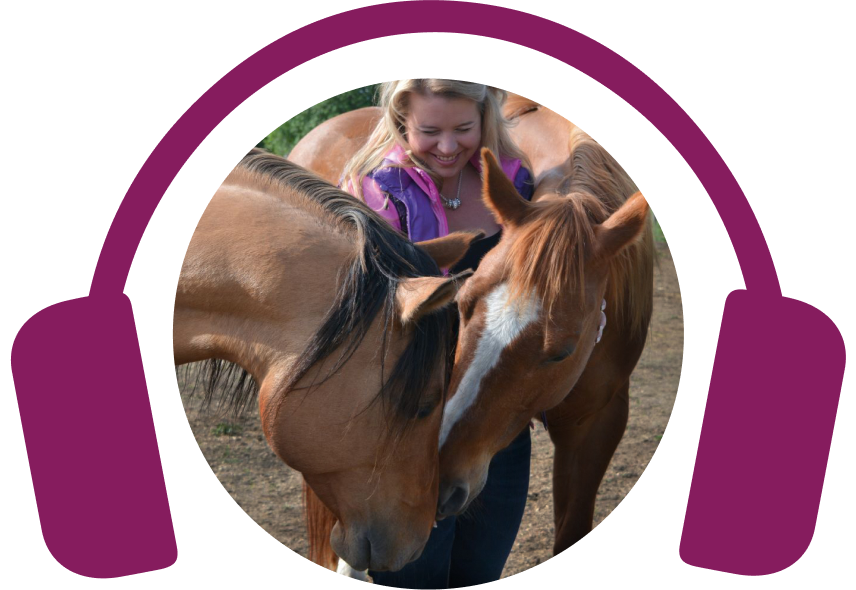Elisha’s Podcast
ELISHA’S PODCAST

Ready to get your horses on the path to better health?
This podcast was created to do just that.
Tune in to get new insights, perspectives, horse health tips, and real-life horse healing stories.
Take what you learn and apply it to your horse TODAY.

One Conversation at a time
From learning what to feed your horse and how to use nutrition effectively, to practicing prevention and approaching specific health challenges naturally, to just bringing your horse more joy and better health…
I’ve got you covered!

Check out my recent episodes
Today, we’re continuing our conversation about mindset and perspective when it comes to your horse’s health. This year, I have received many messages about navigating information overload and conflicting advice about your horse’s health. In this episode, I focus on the vital and often missing emotional support needed for making clear, grounded decisions. Stay tuned to learn the difference between knowledge that truly serves you and information that simply creates more noise. When Knowledge Turns Into Anxiety The more you try to take in, the harder it becomes to filter out the noise. That can result in analysis paralysis, where no option feels safe, and doing nothing starts to feel easier than making a decision. Conflicting Expert Opinions Different practitioners adopt different approaches. Metabolic, biomechanical, emotional, traditional, and alternative approaches all highlight different aspects of the picture, and without a way to bring them together, the information can become extremely confusing. General Advice What works for most horses will not always work for your horse. Each horse has a unique body, history, genetics, and energy. Trying to force a generalized protocol onto an individual horse often delays progress and creates more frustration. Past Experiences Previous losses, mistakes, or missed signs can quietly influence current decisions. Guilt and urgency from the past can cloud your ability to stay grounded and respond clearly in the present moment. The Decision Filter Clear decisions require a simple framework. Before acting on new information, it should pass three questions: Does this align with what I’m observing in my horse right now? Does this address the root cause or only manage symptoms? Can I implement this consistently with the capacity I have today? Observation Comes First Your day-to-day observations matter more than generalized recommendations. What you notice in your horse’s body, behavior, and patterns is primary information. Expert advice is valuable, but it comes second. Root Cause Over Quick Fixes Urgency often pulls us toward symptom management. While comfort matters, lasting improvement comes from understanding what is happening beneath the surface and addressing the underlying cause. Consistency Over Complexity A simple and consistent approach is far more powerful than a complicated, sporadic plan. What you do consistently, day after day, matters far more than accessing all the latest research or trends. Reducing the Noise Restores Clarity Slowing down the flow of information, focusing on careful observation, and sticking to a simple, clear plan helps reduce anxiety and creates space for healing. As you become calmer and more consistent, your horse will likely begin to stabilize too. Trusting Yourself You are the one who knows your horse best. Outside expertise has value, but your insight deserves equal weight. Confidence grows when knowledge and self-trust work together. Links and resources: Connect with Elisha Edwards on her website. Join my email list to be notified about new podcast releases and upcoming webinars. Healing Horses their Way: Get more information and join the waitlist Last week, we looked at how easily our sense of urgency can spill over onto our horses. We explored ways to manage our fears and the urge to intervene when all our horses need is the time and space to heal. Today, I take that a step further by explaining how healing is a steady, repetitive, and imperfect process that requires our trust and patience. Imperfect Progress Horses require consistency, observation, and time for their nervous systems to process changes. Owners often act out of fear or urgency, switching practitioners, modalities, or approaches mid-process. But when we simplify our approach, tension is released, and both horse and human can move at a natural pace. Even though visible results may take weeks, progress is happening beneath the surface. Self-Awareness If you are anxious, impatient, or reactive, your horse will feel it and reflect it back. Healing your horse begins with you regulating your own nervous system and showing up with presence, patience, and clarity, rather than trying to control the outcome. Integration and Patience Healing unfolds in stages. Setbacks, plateaus, and integration periods are normal. Your horse’s body needs time to adjust to new movement patterns, nutrition, and modalities. Owners need to embrace this pace, trusting that chemical and neurological changes are happening even when the results are not immediately visible. Small, Consistent Steps Choose one approach at a time for your horse and commit to it for at least three to four weeks before evaluating progress. For yourself, establish one daily practice that supports your nervous system- a short walk, breathwork, or grounding ritual. Consistency beats intensity. Observation Without Judgment Notice any changes in your horse’s movement, energy, behavior, or body without labeling them as either good or bad, and observe your own emotions without self-judgment. Journaling helps you track patterns, separate emotions from reality, and build confidence in your decision-making. Integration Practices Support your horse with rest, social time, and basic care. Let them lie down, play with friends, or simply relax without interference. Similarly, honor your own needs. Regulated owners make better decisions and create an environment that fosters true recovery. Reflection Track progress with photos, videos, and regular check-ins with trusted practitioners. And for yourself, spend 15 minutes weekly reflecting on what shifted, what was hard, and make the required adjustments. Managing Urgency and Fear Recognize when the urge to act comes from fear, not clarity. Ask yourself: “Will this action move my horse toward healing in the next 28 days?” and “What small step respects my horse’s and my own capacity today?” Small, deliberate actions will keep healing on track. Two-Track Approach Take immediate, low-risk actions while planning high-leverage actions for the future. That honors urgency without hijacking the process, allowing progress to continue steadily while you maintain clarity and focus. Links and resources: Connect with Elisha Edwards on her website. Join my email list to be notified about new podcast releases and upcoming webinars. Healing Horses their Way: Get more information and join the waitlist I have spent the past few weeks reflecting because the start of a new year naturally brings a desire to change what we do, how we do things, or even how we think. If you’ve been sitting with a quiet sense that something needs to shift, for yourself or for your horse, this episode is exactly what you need to hear as we step into 2026. Pay Attention to Your Feelings When you sense that something is different with your horse, pay attention because it matters. A strong connection helps you notice subtle shifts long before anything obvious shows. Ignoring that gut feeling often leads to endless research, outside opinions, and overthinking, which only adds confusion instead of clarity. When Caring Turns Into Freeze Freezing, overthinking, and second-guessing are proof of how deeply you care. The weight of responsibility can feel overwhelming, especially when your horse’s health is on the line. Analysis Paralysis and Lost Intuition Too much information can shut down your intuition. Articles, courses, podcasts, and social media create noise that drowns out the quiet knowing you gain from daily observation and experience with your horse. The Information Collector Waiting to know everything before taking action keeps change out of reach. Confidence does not come from more information. It comes from deciding and taking action, even if the steps are small or imperfect. The Permission Seeker Looking for opinions from vets, trainers, or social media delays leadership. Horses don’t need thousands of opinions. They need an owner willing to advocate, make decisions, and guide their care with clarity and intention. The Worst-Case Spiraler Imagining disasters will drain your energy and stall progress. Indecision becomes a costly choice when fear prevents you from acting. Moving forward requires grounding, focus, and shutting out both external noise and internal catastrophizing. Indecision Versus Intentional Action Doing nothing is still a choice. Creating a plan, committing to it, and adjusting along the way brings stability to both horse and human. Calm, centered leadership will have a direct effect on your outcomes. Intuition as Valid Data Gut feelings are just as important as science. Daily observations, patterns, and responses are meaningful information. Writing them down turns intuition into evidence and builds confidence in decision-making. Alignment Matters Decisions that contradict your beliefs and instincts disrupt flow. When actions align with your values and intuition, outcomes improve. When they don’t, stress rises and progress often stalls. Fire Horse Energy for 2026 The Year of the Fire Horse calls for boldness, movement, and decisive action. It favors momentum over perfection and independence over approval. It’s a push to stop waiting and start acting. Imperfect Action Over Perfect Planning Horses benefit more from timely, intentional effort than from endless preparation. Small, thoughtful changes often lead to noticeable improvements and strengthen trust between horse and owner. Become the Expert on Your Horse Creating a health profile for your horse helps you notice patterns and understand what has led to their current state. Knowing where things have shifted or gone off balance guides the changes your horse truly needs. Fire Horse Goals vs. Frozen Goals Frozen goals keep you stuck in learning mode. Fire horse goals are action-based: you create a plan for your horse, implement it, and adjust as you go. Taking steps- even if they are not perfect- builds confidence and leads to results. Simple Changes Create Real Feedback Small changes give immediate information. Observe what happens, write it down, and adjust as needed. This makes observations into valuable data and strengthens both trust and clarity. Support Without Surrendering Authority Bringing in help doesn’t mean giving up leadership. The right support aligns with your beliefs, respects your intuition, and works with your understanding of your horse. Community Builds Confidence Confidence grows in connection. Shared experience, accountability, and support reduce isolation and replace judgment with learning. Stepping Forward in 2026 This is the year to stop waiting and performing for others. Step up for your horse with courage, commitment, and consistency. Remember that perfection is not a requirement. “Your horse would rather you try at 70% certainty than wait for 100%.” Links and resources: Connect with Elisha Edwards on her website. Join my email list to be notified about new podcast releases and upcoming webinars. Free Webinar Masterclass: Four Steps to Solving Equine Metabolic Syndrome Naturally Save your seat in Elisha's 2-hour live workshop Detox Done Right. Healing Horses Their Way: Sign up for the 6-month payment plan Healing Horses their Way: Get more information and join the waitlist
Meet your host
Hi there, I’m Elisha Edwards

Meet your host
Hi there, I’m Elisha Edwards
I have helped guide thousands of horses back to good health over the years from a variety of different health challenges. And through my courses, webinars, and speaking engagements I educate and empower horse owner’s from around the world to take charge of their horse’s health using the holistic model of health care.
So I know first-hand how difficult and overwhelming it can be to navigate all the different opinions and conflicting information that you come across especially when your horse is faced with a health problem. In many cases, the journey is just as hard on the owners as it is on the horses.
I started Healing Horses with Elisha to guide you, support you, and encourage you through the process of prevention and recovery so you feel good about the decisions you’re making for them.
Here’s what I believe
I have seen countless horses with seemingly impossible health conditions that have been resolved so easily with the right combination of diet, nutrition, and natural remedies. In many cases, it is not the health conditions that prevents the horse from recovering, it is the lack of education, resources, and options that are available.
If the insight and information you gain from this podcast gives you some newfound hope or inspires you to take
a new approach then it has served it’s purpose.
Thank you for giving me the opportunity to help you improve your horse’s health.
Keep listening and learning. Your horse is worth it.
Listen Now
Tune in wherever you listen to your podcasts and follow me so you never miss an episode. I release a new one every Tuesday!

Leave a Review
Reviews help me reach more horses and also help me deliver more relevant content to you!

What my Listeners are saying
“Every time I think there is no way to top what you do – you elevate us to yet another level. I wish I had a fraction of your communication skills. You’re amazing and I am so grateful to be apart of the magic you are creating for horses and their humans.”
Tracey
“Your podcasts are fantastic! I get so excited to listen to the next one. I have 6 geriatric horses and your podcast has really opened my mind to new possibilities in their health and given me the strength to help them through hiccups in their well-being the past few months. I have a nursing education and you explain pathology better than my university professors.”
Sharon
“I can’t thank you enough for the Mindset Tips podcast. I really needed this reminder. It was just what I needed to hear to today.”



